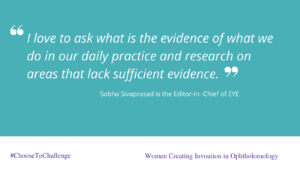International Women’s Day – Driving Innovation In Ophthalmology By Choosing to Challenge
8 March 2021
This year’s theme for International Women’s Day is ‘Choose to Challenge’. We asked members of The Royal College of Ophthalmologists to share their reflections on this theme.
Research and science
The college recognises research is vital in health care and plays a key role in patient care. Academic ophthalmology in the UK continues to be world leading. Find out how women in this field are creating innovation by challenging preconceived ideas.
Jugnoo Rahi is Chair of the Academic Committee which leads the College’s work on research and on academic ophthalmology. She describes one of her main challenges and the work she is doing to overcome this:
“Some think research is just for a small number of academic ophthalmologists somehow far removed from the NHS coalface. This is not the case, and I am challenging this view by offering evidence and perspectives from outside ophthalmology. Firstly the greater the research activity in a hospital, the better the outcomes for all its patients, secondly meaningful participation in research takes many more forms than leading a study and thirdly it is vital that clinicians help shape research to ensure it translates into clinical care.”
Sobha Sivaprasad is the Editor-in -Chief of EYE. She uses questions as a way of driving innovation in Ophthalmology.
“Science is full of unanswered questions and today I try to use available opportunities to research on these areas. I love to ask what is the evidence of what we do in our daily practice and research on areas that lack sufficient evidence.”
We have featured a list of woman lead authors lead female writers who have contributed to Eye Journal this year to share how their work is creating innovation within the ophthalmic community.
Read more about their ground braking research here.
Mariya Moosajee sits on the Academic and Education Committees, and is also a member of the Genomics Working Group at the College.
“My research involves using multi-omic approaches to understanding disease and developing new genetic-based therapies for various inherited eye diseases. Hopefully one day these will become main-stay treatments for our patients.
Despite viral gene therapy being cutting-edge, I have been developing a next-generation form of non-viral gene therapy that avoids using viruses, which can hold larger genes and circumvent unwanted immune reactions. Being able to consider limitations of current therapeutics and consider future possibilities is what drives my research.”
Education and Training
Education
Melanie Corbett is Chair of Education at The Royal College of Ophthalmologists. She talks about the challenges involved in creating a learning programme for all ophthalmic professions.
“In our innovative Ophthalmic Practitioner Training (OPT) Programme, all four ophthalmic professions work and learn together, creating a cohesive workforce delivering effective eye care. By overcoming inter-professional boundaries we can all develop to our maximum potential.”
Training
Fiona Spencer is the chair of Training Committee. This committee has a number of important functions, which include developing and improving training programmes. You can find out more about the work of the Training committee here.
“I have also recently introduced College standards for Ophthalmology Local Training programmes (OLT) to help candidates achieve the CESR requirements.
We are currently designing a new curriculum prioritising generic professional capabilities alongside clinical skills to make future consultants more successful leaders. Incorporating subspecialty training within the training period challenges traditional views but will help set standards for training that will improve patient outcomes.”
Trainees
Laura Maubon, is the current Young Ophthalmologist lead for the UK and Ireland cataract and refractive society (UKISCRS YOP) and works collabortively with trainees who have committee positions at the college. At present she is working on the college on projects relating to the returning experiences of cataract surgeons and improving simulation accessibility.
“Our research shines a spotlight on the impact of surgical hiatus’s amongst individual groups. It unveils that trainees experience more negative challenges which can in part be ameliorated by simulation training and females report childcare 5 x more than male colleagues as a barrier to accessing learning resources.
My work is helping to build momentum in order to try and bridge the accessibility gap to simulation. In two weeks, I will be hosting with UKISCRS young ophthalmologist committee, a remotely supervised, home based simulation event “home-lab”, where the equipment is posted straight to your door!”
International Women’s Day
International Women’s Day provides an important moment to showcase commitment to women’s equality, launch new initiatives and action, celebrate women’s achievements, raise awareness, highlight gender parity gains and more.
From small powerful grassroots gatherings to large-scale conferences and events – International Women’s Day is celebrated everywhere. It’s a big day for inspiration and change. Kathy Evans, CEO of the Royal College of Ophthalmologists sums up this sentiment:
“The roll call of women at the forefront of ophthalmology and ophthalmic research is truly impressive. International Women’s Day is an opportunity to celebrate their achievements, and as a lay person looking on, it is wonderful to note the support they give each other throughout the year.”

